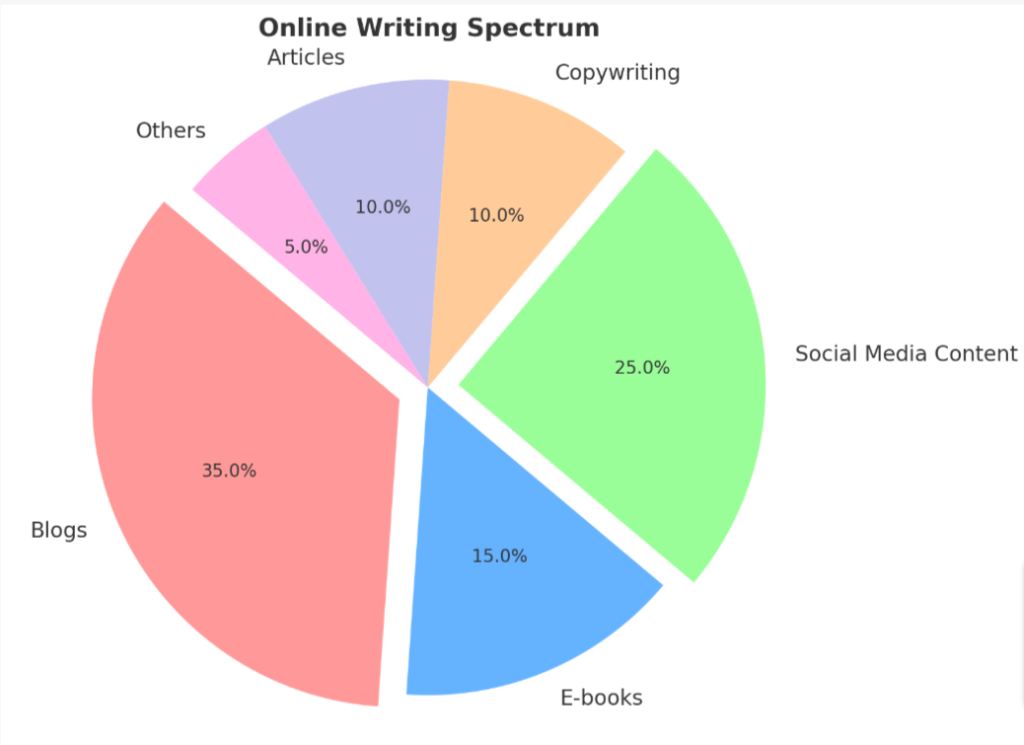Navigating the Digital Writing Landscape: Safety First
Introduction
In an era where the world is increasingly pivoting towards digitization, the sphere of writing has witnessed a revolutionary shift. Gone are the days when writers solely relied on print media or traditional publishing houses to share their craft. Today, the digital landscape offers writers—from seasoned professionals to budding enthusiasts—a platform to showcase their talent, narrate their stories, and engage with a global audience. However, like every coin has two sides, the online world of writing, despite its allure, isn’t without its challenges.
Online writing encompasses a broad spectrum, from blogs, e-books, and articles to social media content, copywriting, and much more. The opportunities are vast and varied, presenting writers with the freedom to explore genres, niches, and mediums like never before. This surge in digital content creation can be attributed to the unprecedented access to the internet, the rise of content marketing, and the ever-growing demand for fresh, relevant content by consumers.
Yet, as writers eagerly jump onto the digital bandwagon, weaving their words into the vast expanse of the internet, it’s crucial to pause and ponder: Is writing online secure? Can these digital platforms be trusted with your intellectual property? Are there hidden pitfalls waiting to ensnare the unsuspecting writer?
This article delves deep into the rewards and risks associated with online writing. While the digital arena beckons with promises of fame, flexibility, and fortune, it also casts shadows of doubt, uncertainty, and potential exploitation. By understanding this delicate balance, writers can make informed decisions, safeguarding their interests while reaping the benefits of the digital age.
The Lure of Online Writing: The Rewards
Accessibility and Flexibility
The primary attraction of online writing is its unmatched accessibility. Unlike traditional avenues, where one would need to navigate the maze of publishers, editors, and stringent guidelines, the digital realm offers a more direct route.
Platforms like WordPress, Medium, and Substack have democratized content creation, enabling anyone with a story to tell or knowledge to share to find an audience. You can write from a sunny beach in Bali, a bustling cafe in Paris, or the cozy confines of your bedroom—the world is your oyster.
Moreover, online writing offers unmatched flexibility. You can write at your own pace, set your schedules, and choose projects that align with your passion or expertise. This flexibility extends to publication schedules, collaboration with other writers or artists, and even the style and tone of your content. The digital world doesn’t box you in; it encourages you to explore and experiment.

Potentially Lucrative Opportunities
Online writing isn’t just about self-expression—it can also be a viable source of income. With businesses recognizing the value of quality content in building brand authority and driving organic traffic, the demand for skilled writers has skyrocketed. Platforms like Upwork, Freelancer, and Fiverr offer a plethora of gigs for content creators, ranging from blog posts and product descriptions to e-books and whitepapers.
Moreover, blogs with significant traffic can be monetized in several ways, including affiliate marketing, sponsored posts, or Google AdSense. Then there are platforms like Medium, which pay writers based on engagement metrics. With dedication, persistence, and a clear strategy, online writing can not only pay the bills but also offer a lucrative income stream.
Building a Global Presence
Online writing obliterates geographical barriers. Your words, once published online, have the potential to resonate with readers from different corners of the world. This global reach amplifies your voice, helping you connect with a diverse audience, receive varied perspectives, and even open doors to international opportunities.
For freelance writers, a global clientele can be especially rewarding. Working with clients from different countries and cultures can offer a fresh perspective, challenge your writing skills, and even lead to consistent, long-term projects. And for those aiming to establish themselves as experts in a particular niche, international recognition can significantly bolster credibility and authority.
Continuous Learning and Skill Development
The ever-evolving digital landscape ensures that writers are always on their toes. With changing algorithms, audience preferences, and emerging platforms, online writing becomes a continuous learning journey. This dynamic environment fosters growth, encouraging writers to hone their craft, understand SEO intricacies, adapt to different writing styles, and stay updated with global trends.
Furthermore, the online community of writers is vast and vibrant. Engaging with fellow writers, participating in workshops, webinars, or online courses, and even simply reading diverse content can significantly enhance one’s writing skills and broaden horizons. In the digital world, every day is an opportunity to learn, adapt, and evolve.
The Dark Side: Risks Associated with Online Writing
Scams and Fraudulent Clients
While the online realm offers myriad opportunities, it also harbors its fair share of pitfalls. One of the most prevalent challenges writers face is navigating through scams and dodgy clients. Fake job listings are rampant, luring unsuspecting writers with promises of high payouts only to vanish without paying for the submitted work. Sites that ask for upfront payments, claiming to provide exclusive access to high-paying jobs, often turn out to be scams.
Writers, especially those new to the freelance world, might also encounter clients who delay payments, continually revise project scopes without adjusting remunerations, or, in the worst-case scenario, vanish without settling dues. It’s essential to be wary, conduct due diligence, and ideally, start work only after establishing clear terms of engagement.
Data Theft and Privacy Concerns
Every time you share your work online, be it on a blog, a portfolio website, or a content marketplace, there’s a risk associated with data theft. Unsecured platforms can become breeding grounds for cyber-attacks, putting your content and personal data at risk. It’s not uncommon to hear of instances where a writer’s work gets stolen and published under a different name or, even more concerning, their personal data being misused.
For freelance writers, sharing documents, payment details, or other sensitive information online further accentuates this risk. It becomes imperative to ensure that platforms used for communication or transaction purposes have robust security measures in place.
Over Saturation and Competition
The ease of publishing online has led to an influx of content. With millions of blogs, articles, and posts going live daily, the digital writing space is saturated. This overabundance implies fierce competition, making it challenging for writers, especially newcomers, to make their mark or gain visibility.
Such competition also affects earnings. With many writers willing to work for lower rates, especially on gig platforms, commanding a price that matches your skill level and expertise might prove challenging. Thus, differentiation, continuous upskilling, and carving a niche become more critical than ever.
Intellectual Property Concerns
One of the most disheartening experiences for a writer is to see their content plagiarized. In the vast expanse of the internet, content theft is rampant. Without proper safeguards in place, your meticulously crafted piece might end up on multiple websites, with someone else taking credit for your hard work.
Moreover, the digital space often operates in a gray area when it comes to copyright laws. Unlike traditional publishing, where contracts and copyright terms are clearly defined, online platforms can be ambiguous. It’s crucial for writers to be aware of platform-specific terms, use tools to detect plagiarism, and, when possible, register their works to ensure legal protection.
Safeguarding Your Online Writing Journey
Do Your Homework
Before diving headfirst into any online writing opportunity, it’s paramount to conduct thorough research. Check the credibility of websites or platforms where you’re considering publishing or looking for gigs. Read reviews, seek feedback from fellow writers, and understand the terms and conditions. For freelance writers, vetting potential clients is equally crucial. Ask for references, look them up online, and consider platforms that offer payment protection.
Implement Strong Security Measures
Cybersecurity should never be an afterthought. Ensure that any platform you use, be it for publishing, storing, or sharing your work, follows stringent security protocols. Regularly update your passwords and consider using two-factor authentication wherever possible. When sharing sensitive information, like contracts or payment details, use encrypted communication methods. Regular backups of your work can also save you from potential data losses.

Use Plagiarism Detection Tools
To keep a check on content theft, make plagiarism detection tools your best friend. Platforms like Copyscape, Grammarly, or Turnitin can scan the internet to see if your work appears elsewhere without your permission. While these tools can’t prevent theft, they can alert you to potential violations, allowing you to take corrective measures.
Understand and Assert Your Rights
Knowledge is power. Familiarize yourself with basic copyright laws and understand what rights you have over your content. Platforms might have varied terms regarding content ownership, so always read the fine print. When in doubt, seek legal counsel. For important pieces, especially those with commercial potential, consider getting them copyrighted.
When working with clients or collaborators, be clear about ownership rights from the outset. Contracts, even informal ones, should clearly state who owns the content, the scope of rights granted, and the duration of those rights.
Cultivate a Unique Voice and Niche
In a saturated market, differentiation is key. Rather than trying to be a jack-of-all-trades, focus on honing a unique voice and specializing in a niche. Whether it’s a specific genre, topic, style, or medium, having a specialization can make you stand out, command better rates, and reduce direct competition. Building a personal brand around this uniqueness can also lead to better recognition and opportunities.
Join Writing Communities
There’s strength in numbers. Joining online writing communities can provide a wealth of benefits. From learning about potential scams to getting advice on tricky client situations, or simply networking and finding collaboration opportunities, being part of a community can offer a safety net. Sites like Absolute Write, WritersCafe, or various LinkedIn and Reddit groups are excellent places to start.
Continuous Learning
Stay updated with the latest trends, tools, and best practices in online writing. Enroll in online courses, attend webinars, or participate in workshops. The more you’re equipped with knowledge, the better you can navigate the online writing world’s complexities and ensure your journey is both rewarding and secure.
Conclusion: Striking a Balance Between Opportunity and Caution
In the digital age, the world of online writing is expansive and full of potential. Writers can reach global audiences, work with diverse clients, and explore multifaceted opportunities, all from the comfort of their homes. The freedom and flexibility it offers are unparalleled, making it an attractive avenue for many aspiring and seasoned writers.
Yet, like any vast frontier, the online realm comes with its share of challenges and hazards. The same technology that allows for widespread dissemination of your words also paves the way for potential misuse, fraud, and theft. The anonymity and vastness of the internet can sometimes make it a breeding ground for unsavory practices, targeting unsuspecting individuals.
However, it’s essential to remember that while the risks are real, they are not insurmountable. Armed with knowledge, preparedness, and the right tools, writers can safeguard their work and their careers. It’s about understanding the digital landscape, being proactive in protecting oneself, and constantly learning and adapting.
In essence, the world of online writing is akin to a vast ocean. While its depths hold treasures beyond imagination, they also harbor challenges. Yet, with the right navigation tools, every writer can chart a safe and rewarding course. Embrace the opportunities, but always keep an anchor of caution at hand. The balance between seizing opportunities and practicing due diligence will pave the way for a fulfilling and secure online writing journey.
Additional Resources for a Safe Online Writing Career
Websites and Blogs
For those looking to keep a pulse on the latest trends, challenges, and opportunities in the online writing world, several websites and blogs provide invaluable insights:
- Writer Beware: A blog that shines a light on the various scams and pitfalls that writers might encounter.
- The Write Life: A comprehensive resource offering advice on everything from freelance writing, blogging, publishing, and more.
Online Courses
Enhancing your knowledge can be one of the best defenses against potential pitfalls. Consider enrolling in courses that cover:
- Digital Literacy: Understanding the basics of the digital world, from SEO to the mechanics of the internet.
- Cybersecurity for Writers: Courses that cater specifically to writers, focusing on how to protect their work and data online.
Tools and Software
Equip yourself with tools that can make your online writing journey smoother and more secure:
- VPN Services: Encrypt your internet connection, making it harder for hackers to intercept your data.
- Secure Cloud Storage: Platforms like Dropbox or Google Drive offer encrypted storage options, ensuring your files are safe from unauthorized access.
- Digital Watermarking Tools: These can embed invisible marks on your digital documents, providing an added layer of protection against theft.

Forums and Communities
Beyond the ones mentioned earlier, numerous other communities cater to writers. They serve as platforms for discussion, advice, and networking:
- Writing.com: A massive online community for writers of all levels and genres.
- Kboards Writers’ Cafe: A forum for authors and writers, particularly those involved in self-publishing.
Legal Resources
Sometimes, you might need legal assistance or advice. Knowing where to turn can be invaluable:
- Volunteer Lawyers for the Arts: They offer legal help, particularly for copyright issues, to artists and writers.
- Creative Commons: Understand the different licenses available and how you can use them to protect your work.
Books
Several books provide insights into the world of online writing, covering both its challenges and opportunities:
- “The Digital Writer’s Guide” by Lila Hart: A comprehensive look into the world of online writing, covering everything from finding gigs to protecting your work.
- “Cybersecurity for Writers: Protecting Your Work in the Digital Age” by Neil Roberts: A deep dive into the specific challenges writers face online and how to overcome them.
Incorporating these resources into your toolkit can bolster your defense against potential risks while simultaneously enhancing your potential in the online writing world. Continual learning and adaptation are the keys to navigating the evolving landscape of digital writing successfully.

FAQs: Common Concerns Addressed
How can I verify the legitimacy of an online writing platform or client?
Before committing to any platform or client, it’s advisable to conduct a thorough online search. Look for reviews, testimonials, and feedback from other writers. Platforms like Glassdoor, Trustpilot, or even specific writing forums can be beneficial. Additionally, trust your instincts; if something feels off or too good to be true, proceed with caution.
What should I do if I suspect my work has been plagiarized?
If you suspect your work has been copied without permission, start by reaching out to the alleged plagiarizer and request them to either credit you or remove the content. If this doesn’t work, you can send a formal cease and desist letter. In situations where the plagiarized content is on a platform like a blog or website, you can also contact their hosting provider.
Familiarize yourself with the Digital Millennium Copyright Act (DMCA), which can assist in taking down plagiarized content from websites.
How often should I back up my writing?
Regular backups are crucial. Depending on how often you write or update your content, a weekly or bi-weekly backup might be sufficient. However, for writers who produce content daily, considering a daily or even real-time backup solution might be ideal. Utilize cloud storage solutions as they often come with automatic backup features.
Is it safe to use public Wi-Fi when working on my writing projects?
While public Wi-Fi is convenient, it’s less secure than private networks. If you must use public Wi-Fi, ensure you’re using a Virtual Private Network (VPN) to encrypt your connection, thereby keeping your data safe from potential snoopers.
Do I always need a contract when taking on a new writing job?
While you might not legally require a contract for every job, it’s highly recommended. A contract clearly defines the terms of the job, payment, content ownership, and other crucial aspects. It protects both you and the client and ensures clarity on expectations.
How can I stay updated on the latest online security threats relevant to writers?
Join online writing communities, subscribe to blogs or websites focusing on cybersecurity, and consider following relevant accounts on social media platforms. Regularly updating your knowledge can protect you from emerging threats.
Are there any red flags I should be aware of when communicating with potential clients?
Absolutely. Beware of clients who:
- Avoid signing contracts or are vague about payment terms.
- Offer rates that are either too good to be true or significantly below market value.
- Are unwilling to provide verifiable contact information.
- Push for free samples without a clear project outline.
- Use high-pressure tactics to get you to agree quickly to terms.
By addressing these common questions, writers can equip themselves with the necessary knowledge to navigate the complexities of the online writing landscape with confidence and security.
Final Thoughts: Navigating the Digital Writing Landscape with Confidence
The digital age has transformed the very essence of how we write, share, and monetize our craft. With vast platforms, instantaneous communication, and a global audience at our fingertips, the opportunities for writers are unparalleled. However, as with every boon, there are accompanying challenges.
Embracing the Digital Revolution
Writers today aren’t just scribes; they’re also navigators of the digital realm. As the boundaries between the physical and virtual worlds blur, it’s imperative to harness the power of online platforms. Blogs, e-books, web content, and social media posts are just a few of the formats that writers can delve into. Moreover, with the growth of AI and interactive content, the scope for innovation in writing is vast.
Prioritizing Security and Integrity
While the online space offers countless opportunities, it also presents unique challenges in terms of security. Ensuring that your work is protected, your personal information is safe, and your financial transactions are secure becomes paramount. A blend of vigilance, knowledge, and the right tools can make all the difference. Remember, it’s not about being fearful but about being prepared.
Building Authentic Relationships
The online world, despite its vastness, thrives on authentic human connections. Whether it’s with clients, readers, or fellow writers, building genuine relationships is crucial. It not only fosters trust but also creates a supportive community where experiences, advice, and resources can be shared. Engage actively on writer forums, attend virtual workshops, or collaborate on projects to build and nurture these relationships.
Continuous Learning: The Key to Thriving
The digital landscape is ever-evolving. What’s relevant today might be obsolete tomorrow. Hence, for writers, continuous learning becomes a necessity. From understanding the latest SEO practices to staying updated on copyright laws and from mastering a new writing tool to grasping the nuances of a trending writing style, there’s always something new to learn.
Celebrating the Rewards
While understanding and mitigating risks is essential, it’s equally important to celebrate the rewards the online world brings. The joy of connecting with a reader from a different part of the world, the satisfaction of seeing your blog grow, or the pride in completing a challenging assignment for an online client – these moments make the journey worthwhile.
As writers traverse the intricate maze of the digital realm, they must remember that with every challenge comes an opportunity. By arming oneself with knowledge, staying adaptive, and maintaining a balance between caution and ambition, success in the online writing world isn’t just possible; it’s guaranteed.

